Deep Space Magnificent Hatari with a touch of biology, and anything shiny I like the look of
Don't wanna be here? Send us removal request.
Text
Do I support British farming? No, actually. My relationship to British farms is purely transactional. If you want my support, maybe don’t be right wing, Brexit voting, misogynistic science-deniers who actively contribute to climate change, pollution and biodiversity loss. Going to see how much of my diet can be made of imported food. Bye
0 notes
Text
Reasons I’ve had a migraine
- it’s been such a week
- sun was bright
- long journey
- strong smell
- one (1) alcoholic beverage
6 notes
·
View notes
Text
I had the classic ‘sitting an exam you haven’t studied for’ dream last night. This time, it was ABRSM grade 5 violin, and it was taking place at the local Vet clinic, obviously.
0 notes
Text
Friendship is when you send a message to your friend on holiday in Istanbul asking if they’ve been to Topkapi palace and if not, can they go and take lots of pictures please, because it’s in my favourite TV show. And they do!
11 notes
·
View notes
Text
Zülfikar Pasha would be the most useful character in the Kösem series if he would only stop telling his enemies the plan! Other than that, 10/10 loyal Pasha, you want him on your team
2 notes
·
View notes
Text
Reblog to open a rail line from your blog to the person you reblogged this from

194K notes
·
View notes
Text
I saw an astronaut walking on the side of the road today, which is the kind of thing my brain will placidly accept at first, only to go "Wait, an astronaut" a minute later once I'm done with my previous train of thought. By then I felt like it might be too late to stop my car, but I ended up stopping anyway because I didn't want to spend the rest of the afternoon wondering.
I waited for the astronaut to catch up with me since they were going in my direction, but they didn't. Eventually I got out of the car and retraced my steps, and after a bend in the road when I saw no one walking towards me I decided the visitor must have gone back to their spacecraft and I would never get an explanation for this—and then in the distance I caught a glimpse of the white space suit disappearing into the forest.
I managed to catch up with them and they turned out to be a distant neighbour of mine (let's call her M.), and what looked like a space suit when I was driving by was a beekeeper's outfit! (Sorry for the pointless suspense but I was taking you on the same little journey my brain went through.) M. was tickled when she learnt that I mistook her for an astronaut—she told me she'd borrowed her husband's too-big shoes which made her drag her feet, hence why she looked like she was having trouble readjusting to Earth's gravity.
Then she said that one of her hives had swarmed, and she was pretty sure she knew where the swarm was. I had no idea how swarming worked so as we walked in the woods she explained that when a hive becomes too crowded, the queen will get replaced by a new one, and the old queen will leave along with half of the bees. After this split, the swarm will cluster somewhere nearby and wait while scout bees fly away in search of a new hive location. "That's when you have to catch them—if you can find the swarm. But here it is!"

I wasn't expecting quite so many bees!! I'm pretty scared of all flying creatures so allow me to pat myself on the back for what came next—I thought I was about to learn how to catch a swarm from a prudent distance, but M. asked if I could give her a hand, seeing as her husband was supposed to be here to help but clearly wasn't.
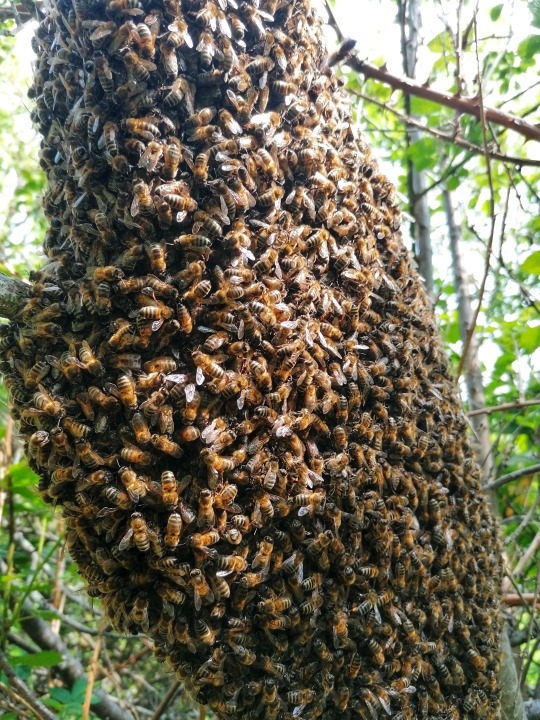
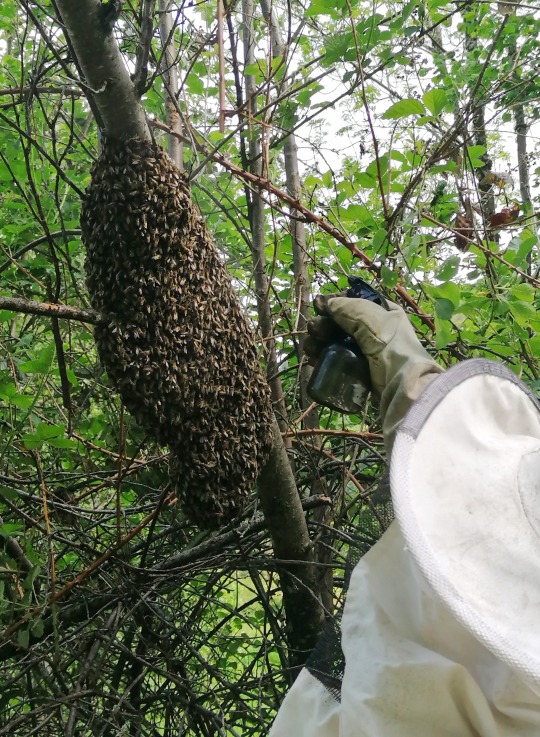
The first step of catching a swarm was spraying the bees with sugar water, and I was glad not to be asked to help with that, as it seemed like something that could make bees angry. ("On the contrary, it makes them less agitated!" I was told, but that remained to be seen.) Step 2 was pulling on a rope tied to the tree branch in order to lower the swarm into the new hive, and that was the job I was recruited for. The rope was long enough that I could stand several metres away to pull on it, but my role in this swarm-catching business was still all too clear to any angry bee looking for someone to blame.
I remembered reading that bees can sense the electric field of flowers, so I thought there was no way they wouldn't sense the staticky nervousness coming from the rope-puller, but thankfully they completely ignored me.
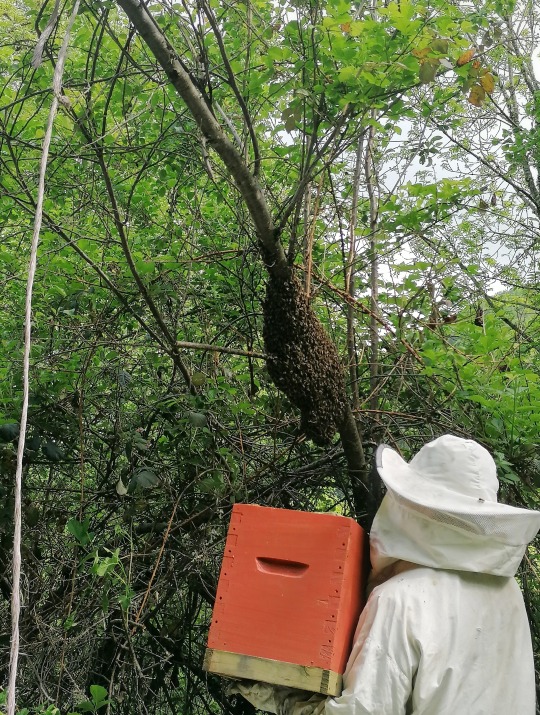
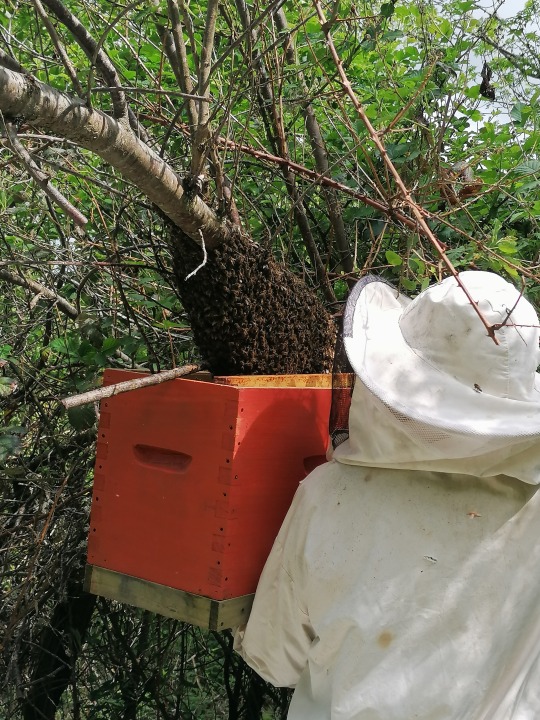
M. was offering one fun fact about bees after the other, in a very relaxed voice, which was very interesting and very soothing for both me and the bees. She said this particular colony was very sweet ("some bee colonies are meaner than others?" "yes of course"), and that swarming usually happens a bit earlier in the year "but it's been raining so much lately, the bees had to postpone all their activities, just like us" and also "swarming involves quite a bit of planning ahead of time; for example worker bees have to put the queen on a diet so she won't be too fat to fly. Did you know that?" I did not!
Unfortunately our first attempt to catch the swarm failed. The bees entered the hive, had a quick look around their new home, then left in disgust and formed a thick, angry, buzzing cloud over our heads, while I tried to think nothing but bee-loving thoughts to make my electric field harmless and friendly.
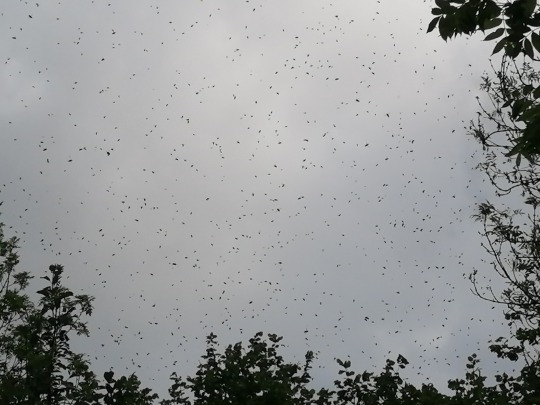
Then one after the other all the bees returned to the exact same spot on the branch where we'd first found them. ("Because it smells like the queen" said M.) We examined the near-empty hive and found that a mouse had made a nest in there! She was no longer here but the traces of her passage were evident (some of the comb was very nibbled.)
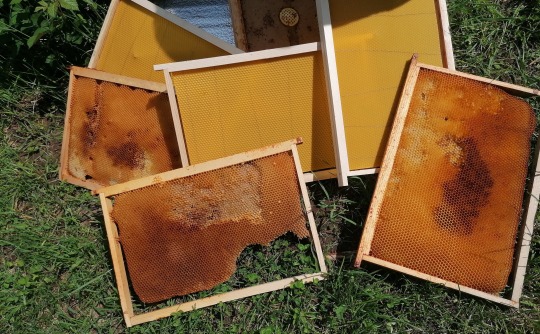
As we were removing the supplies brought in by the mouse (sticks, hay), M.'s husband joined us and he had brought a spray bottle containing some sort of bee-attracting liquid (pheromones?) (I didn't have a close look at the bottle because I made sure to stay far away from the bee-attracting liquid, while he sprayed it inside the hive.)
He had also brought a white sheet which he spread under the tree, explaining that the bees will want to get away from the bright surface and look for darkness, thus hopefully getting inside the box. Another thing I learnt is that once the queen enters the hive, the nearest worker bees will spread the message by turning round and fluttering their wings to send a chemical signal in specific directions, which will be picked up by other bees farther away; at strategic intervals some bees will light the beacons of Gondor turn round and fan their wings to relay this scent-message until the entire colony is informed of the queen's new location.
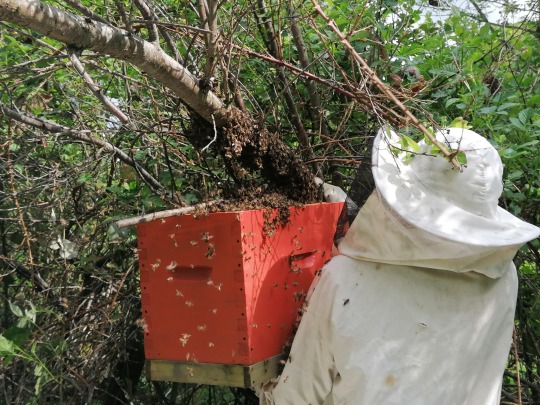
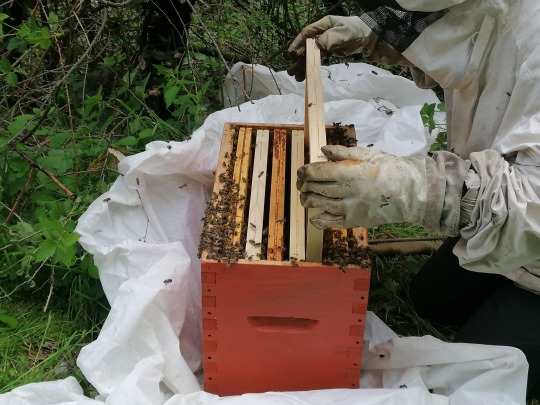
We were more successful the second time around! This time the bees who went in didn't immediately get out again to return to their branch. Well I say "we" but I didn't volunteer to pull on the rope again, so I can't claim any role in this victory. But my personal victory was that I stood quite a bit nearer this time so I could watch everything closely, and I felt more intrigued than nervous. Bees were constantly zipping past me but it had become clear that my electric field was pure and they bore me no ill will. I was always fond of bees from afar and happy to see them do their thing in flowers in the spring, but today's adventure got me interested in their daily life as well, so I think I'll read some books about bees this summer!
I was reading last month about the morality of termite colonies (Maeterlinck's La vie des termites) and I had a feeling this man must have written some poetic stuff about bees as well—and he did. Here's a translated excerpt from his book "La vie des abeilles" :)
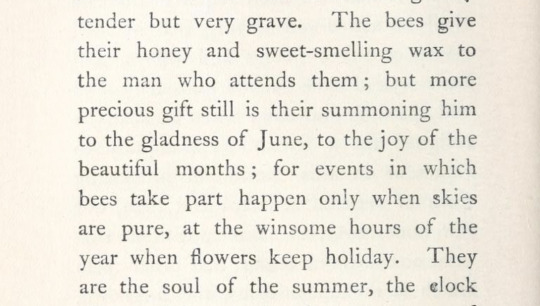
4K notes
·
View notes
Note
Whats a lichen if not a plant
(Note: writing this response with Capitals™ bc its long and kind of hard to read otherwise, I’m trying to do that more with my longer posts)
Either an ecological event or a superorganism, depending on how you look at it.
To explain this. like. we do not ‘know’ what a lichen is. We know like, what they are, or at least we’re getting increasingly closer to finding out everything that makes up a lichen, but lichenologists have really struggled to define it as like, A Sole Thing. Botanists and mycologists of the past thought lichens were primarily fungi, because when you dried one out and weighed it, most of the dry weight was fungus; this is why today we still name lichens based on their fungal components, while it turns out that the give and take of all organisms in a lichen are pretty much equal.
It’s a symbiotic relationship, we’ve known that for a long time, but now we know, for instance, that some fungi can pair up with different species of algae to make different lichens. How can we reliably name something after it’s fungus if that fungus can pair up with different things to make multiple different ‘species’? And as of 2016 we know that lichens can have up to four different players: a fungus, an algae, a yeast, and (in some families) a second fungus, previously thought to be parasitic on the lichen itself.
I will personally argue that lichens are an ecological event. To me, this theory gets down to lichen reproduction, which is….completely off the shits.
Lichens can reproduce in a few different ways, the simplest ones being 1. a piece of lichen breaks off and lands in a fitting environment, creating a new lichen that’s a clone of the mother system, and/or 2. a lichen has special organs that release specially-made ‘mini lichens’ that have the main components packaged together into little ‘spores’ (these organs are called isidia and soridia, and look slightly different), creating a similar result to #1 with a clone of the mother system.
Now, you may be wondering: ‘But lichens have sexual structures. can’t they have like, Lichen Sex™?’. Which. Like. This is where it gets wild, because it ties back to the ecological mystery of how lichens ‘make new lichens from scratch’ so to speak.
The thing is, those sexual structures don’t have the components paired together. They only produce sexually-made spores of the fungus, and if these spores land in the right conditions, they won’t form a lichen, they’ll form a non-lichenized version of that fungus. So, conventionally, as we currently understand it, the way for them to form a new lichen would be for two compatible spores- one algae and one fungus, or like, one algae and one fungus or one yeast, we don’t know how those other components fit into the equation yet– to meet in the right conditions, under which case the pair recognizes each other and starts to spontaneously go down an entirely different developmental path to become a lichen. Keep in mind that lichen and algae spores are like…everywhere in the air and in the world around us, just the majority of them don’t find the proper growing conditions and die, so this does happen enough to make all the lichens we see on a day to day basis.
But. There are agonizing mysteries about this process. For example:
-We do not know how the algae and fungal spores, when they meet, know that they’re compatible in the first place. Like, on a cellular level.
-We do know that after a certain point, the organisms involved are locked into their developmental path. They need to meet at an extremely young age (as spores) to become a lichen. If a mature fungus and a mature algae meet, nothing happens, even if they would have been compatible as spores.
-Science, to my knowledge, still has not yet been able to replicate the ‘lichens being made from scratch’ process in a lab. The spores will recognize each other and start developing on a microscopic level, and then they’ll just….stop developing and die, which is why we can only produce new lichens in a lab by growing sterilized fragments from old lichens. Whether or not we’ve just been like, missing all the ‘ingredients’ and you need a yeast or second fungus or something to finish the process, I have no idea.
In conclusion: Lichens are mysterious soups. Lichens, to me, aren’t a thing that lives, but more like a thing that happens between living things. It’s an event of several different things coming together to proliferate on a tree or a rock or wherever, and they are everywhere, and we do not know everything about what they are or how they work. Some people, again, will call them ‘superorganisms’, which isn’t wrong either, but I personally like to think about them in a weird like…..temporal sense? Idk man they haunt me every day of my life.
5K notes
·
View notes
Text
why do grooms get one boring black jacket and brides get the most jawdropping gowns ever like when i get married i want pearls and lace and a train is that too much to ask??
252K notes
·
View notes
Text

It's my 10 year anniversary on Tumblr 🥳
1 note
·
View note
Text

having a normal one in my family's groupchat rn
20K notes
·
View notes
Text
look, I know I've talked about this essay (?) before but like,
If you ever needed a good demonstration of the quote "Any sufficiently advanced technology is indistinguishable from magic", have I got an exercise for you.
Somebody made a small article explaining the basics of atomic theory but it's written in Anglish. Anglish is basically a made-up version of English where they remove any elements (words, prefixes, etc) that were originally borrowed from romance languages like french and latin, as well as greek and other foreign loanwords, keeping only those of germanic origin.
What happens is an english which is for the most part intelligible, but since a lot everyday english, and especially the scientific vocabulary, has has heavy latin and greek influence, they have to make up new words from the existing germanic-english vocabulary. For me it kind of reads super viking-ey.
Anyway when you read this article on atomic theory, in Anglish called Uncleftish Beholding, you get this text which kind of reads like a fantasy novel. Like in my mind it feels like it recontextualizes advanced scientific concepts to explain it to a viking audience from ancient times.
Even though you're familiar with the scientific ideas, because it bypasses the normal language we use for these concepts, you get a chance to examine these ideas as if you were a visitor from another civilization - and guess what, it does feel like it's about magic. It has a mythical quality to it, like it feels like a book about magic written during viking times. For me this has the same vibe as reading deep magic lore from a Robert Jordan book.
44K notes
·
View notes
Text
YouTube - Instagram profile
cook_as_you_feel_it
54K notes
·
View notes

